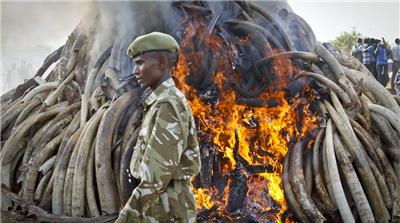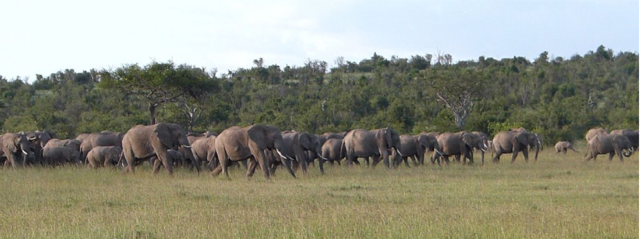
In recent years because of the massive demand for ivory from the Far East there has been a huge increase in poaching of elephants in all the last remaining countries where they still exist. This has reached a crisis level with over 30,000 elephants now being killed every year across Africa and with a total population of a little over 300,000 elephants left in Africa today, there is a danger that elephants are heading for virtual extinction within a decade unless the killing can be stopped.
Kenya’s Commitment to Act on Poaching
The Kenyan authorities have given assurances that effective action is now being taken to stamp out poaching of elephants and rhinos. Kenya has suffered a rapid decline in the country’s elephant population in recent years and conservationists have been calling on the government to take action to stop the poaching.
William Kiprono, the Director General of Kenya Wildlife Service, is reported in the local media to have confirmed that 2011, 2012 and 2013 saw levels of poaching that exceeded those in the 1980′s, which was when poaching was previously at its height until an international ban was imposed on trade in ivory in 1989. At a press conference held last month in Nairobi, Mr Kiprono said that the level of poaching appears to have declined in 2014 and there has been a decrease from previous years.
During the last twelve months over 1,400 suspects were arrested and prosecuted for various wildlife crimes and a suspected ivory smuggler believed to be responsible for the slaughter of hundreds of elephants was arrested recently in Tanzania and has been on remand in prison in Mombasa.
Ivory Stockpiles Destroyed
This month, the Kenyan Government made a commitment to destroy all stockpiles of ivory that it holds by the end of 2015 as a symbolic act to demonstrate that it is opposed to any trade in ivory. The first stockpile of 15 tons was burnt in a ceremony in Nairobi on March 3rd by President Uhuru Kenyatta to celebrate World Wildlife Day.

Kenya Wildlife Service: Ivory Burning March 2015
In a speech at the ceremony, President Kenyatta said: “In order to underline our determination to eradicate poaching, my Government shall burn the rest of the stockpile within this year. We hope the rest of the world will follow our action in the same manner”.
The President added “The destruction of confiscated elephant ivory by itself does not put an end to the illegal trade. However, coupled with the seizure of ivory and prosecution of offenders, it sends a powerful message that Kenya does not accept and will not tolerate this illegal trade or the devastating impact it is having on the African elephant and on the livelihoods of rural communities”.
Reducing Demand & Increasing Prosecutions
Kenyan conservationists have also been urging the Chinese government to do more to crack down on illegal imports of ivory from Africa and to ban the domestic trade within China. The Chinese government reacted last month by agreeing to ban all imports of ivory with immediate effect for one year. They also warned their citizens not to travel back to China with ivory. However they have not banned the internal trade in ivory within China itself and unless this is done it is likely that there will be no reduction in the huge demand for ivory from the newly affluent Chinese citizens which is what is causing the poaching.
So it is important that Kenya increases its efforts to arrest and prosecute those involved in poaching and ivory smuggling and continues to provide protected areas where elephants are safe inside national parks, reserves and wildlife conservancies. This is vital if elephants are to continue to survive in the wild.


on Wednesday 18th March 2015 at 11:04







